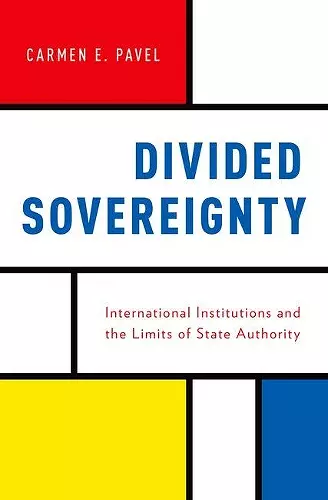Divided Sovereignty
International Institutions and the Limits of State Authority
Format:Paperback
Publisher:Oxford University Press Inc
Published:27th Jul '17
Currently unavailable, and unfortunately no date known when it will be back
This paperback is available in another edition too:
- Hardback£102.50(9780199376346)

The question of how to constrain states that commit severe abuses against their own citizens is as persistent as it is vexing. States are imperfect political forms that in theory possess both a monopoly on coercive power and final jurisdictional authority over their territory. These twin elements of sovereignty and authority can be used by state leaders and political representatives in ways that stray significantly from the interests of citizens. In the most extreme cases, when citizens become inconvenient obstacles in the pursuit of the self-serving ambitions of their leaders, state power turns against them. Genocide, torture, displacement, and rape are often the means of choice by which the inconvenient are made to suffer or vanish. In Divided Sovereignty, Carmen Pavel explores new institutional solutions to this abiding problem. She argues that coercive international institutions can stop these abuses and act as an insurance scheme against the possibility of states failing to fulfill their most basic sovereign responsibilities. She thus challenges the longstanding assumption that collective grants of authority from the citizens of a state should be made exclusively for institutions within the borders of that state. Despite worries that international institutions such as the International Criminal Court could undermine domestic democratic control, citizens can divide sovereign authority between state and international institutions consistent with their right of democratic self-governance. Pavel defends universal, principled limits on state authority based on jus cogens norms, a special category of norms in international law that prohibit violations of basic human rights. Thoughtfully conceived and forcefully argued, Divided Sovereignty will challenge what we think we know about the relationship between international institutions and the pursuit of the fundamental requirements of justice.
Divided Sovereignty is a lucid piece of work that makes a coherent argument in favor of a pluralist conception of multilateral institutions, which would serve as the agents of peoples and, as a last result, protect peoples against fundamental violations of human rights. * Robert O. Keohane, Princeton University *
Pavel provides a systematic and thoughtful account of the reasons why coercive international institutions are needed, the nature of their authority, and why individuals should support them and states should comply with their rules. Her book is a valuable contribution to the nascent shift in theorizing about global justice toward taking institutions seriously. * Allen Buchanan, Duke University *
Divided Sovereignty makes a compelling case for supplementing sovereign states with coercive international institutions. Though it shares a concern for global justice, the book presents a powerful alternative to the institutional visions typically outlined by cosmopolitans. By prioritizing good institutional design over abstract morality, and defending the importance of collective self-determination, Pavel reorients recent debates. This is an original and important book. * Anna Stilz, Princeton University *
ISBN: 9780190692179
Dimensions: 231mm x 155mm x 15mm
Weight: 340g
242 pages